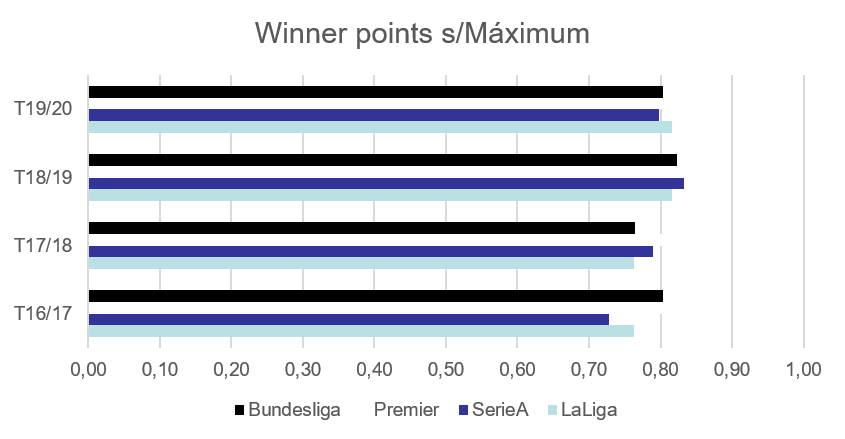The sharing of data from the 4 major European football leagues is an issue of great interest to professionals, academics and fans. The interest arises from the perception of each other about where things are best done, where the best game is practiced, where the best couches and players are, etc. The comparison elements are particularly controversial as what seems obvious to some is not relevant to others. The data help to a more objective comparison, but it is not always clear which data types are the better ones that help the proposed objective.
From the perspective of economic field, very interesting situations are generated that allow to contrast behaviors of the agents that theoretical models predict, in particular, the models of production, competition, regulation and strategic behavior among others. See the contributions of I. Palacios-Huerta of the London School of Economics and his friend A. E. Roth (Nobel Prize in Economics in 2012 with L. Shapley). In them, for example, it shows how kicking penalties is a Nash (Nobel Prize in Economics in 1994) equilibrium and accurately complies with the predictions of theory. Or, in kicking penalties when there are draws in playoff series, you get that order is very important and he proposes to use the same mechanism as in 'tie breaks' in tennis, where order alternates and is not important in the final result.
Team sports competitions have very special characteristics, on the one hand, competitors agree on how to organize the competition; on the other hand, each team competes with everyone else to achieve the sporting result it aspires to. Collaboration and competition occur at the same time.
From the point of view of the performance achieved by these teams in their production process in the last 4 seasons, it is observed that the champion is getting quite close to the maximum points that a team can get in the competition. On average, the points that the champions of these competitions get are above 80% of the maximum. The Premier League appears as the dominator, with an average level of more than 85%, the other three are in similar values, about 80%.
From the point of view of the performance achieved by these teams in their production process in the last 4 seasons, it is observed that the champion is getting quite close to the maximum points that a team can get in the competition. On average, the points that the champions of these competitions get are above 80% of the maximum. The Premier League appears as the dominator, with an average level of more than 85%, the other three are in similar values, about 80%.

However, there appears to be greater homogeneity among LaLiga teams as competitors, resulting in a greater number of matches with draws, the result that 'a priori' can anticipate between similar teams.
| Bundesliga | Premier | Serie A | La Liga | |
| Wins | 76% | 77% | 77% | 74% |
| Draws | 24% | 23% | 23% | 26% |
From the perspective of the spectators, the more interesting the matches the greater the number of goals generated for the same final sporting score. It is often stated that 'goals are the sauce of football'. The number of goals in a match is not limited as the number of points, however, games with many goals are scarce.
Goals are not the fundamental sporting result, they are the points, therefore they are an intermediate result necessary to get points, without goals the points are limited to a minimum. That is, attacking strategies, with the highest number of goals are preferred to defensive without goals. Under this perspective, if you look at the goal-by-point ratio achieved, on average it is the Bundesliga the most goal scorer competition, followed by the SeriaA, the Premier and LaLiga.
| Bundesliga | Premier | SerieA | LaLiga | |
| Goals/Points Media | 1,09 | 0,99 | 1,03 | 0,97 |
| Goals/Points Winner | 1,13 | 0,99 | 0,86 | 1,01 |
| Goals/Points Last Clasf. | 1,48 | 1,21 | 1,61 | 1,27 |
In the table it can show that there is an excess of goals per point in the last qualifiers which is interpreted as a remarkable loss of efficiency of these teams, in the process of transforming goals into a sporting result.
Would it be appropriate to implement a goal rating system instead of points?
They would not change the final classifications much, currently the level of correlation between the two systems is almost 90%. No doubt the games would be more fun, without goals there would be no points.
Summary of the article published in:https://seed-deporte.es/las-4-grandes-ligas-europeas-de-futbol/
Authors: Manuel A. Espitia-Escuer
(The opinions expressed in this article are the sole responsibility of the author)




